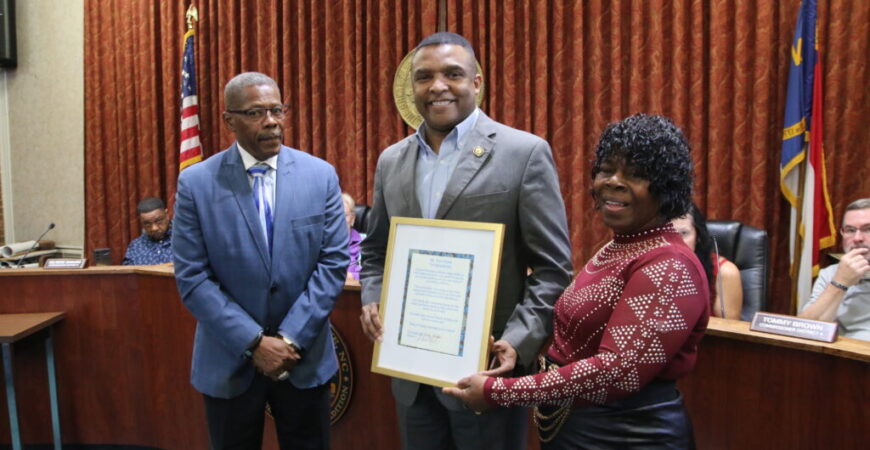MOUNT OLIVE — Once again, the issue of Mount Olive’s challenges regarding its wastewater treatment facility and the state-issued moratorium on any additional flow through the facility took center stage at the town’s Board of Commissioners meeting on Monday evening.
At the invitation of interim town manager Glenn Holland, Caroline Bari, from the North Carolina Department of Environmental Quality, Division of Water Infrastructure, gave a PowerPoint presentation explaining the issues leading to the wastewater moratorium placed on the town, as well as what steps will be needed to bring the system into compliance.
Bari got involved in the town’s wastewater woes about 18 months ago as a result of her duties, which include working with distressed units like the town’s wastewater treatment system.
“The town is under a special order, by consent,” Bari said. “It was issued by the Division of Water Resources because the town is having trouble, especially during heavy rainwater events, with untreated sewage being released.”
According to Bari, the current consent order is not the first the town has entered into with the state.
“The first consent order was signed by the town and issued in October 2021,” she said. “In the original consent order, among other things, was a list of items that needed to be completed and dates. The town got behind and was starting to get fined. The state and the town renegotiated the consent order and it was reissued in April 2025.”
Bari said both consent orders have restricted how much wastewater the town can treat at its facility.
“In both of these consent orders, one very important issue is that the town of Mount Olive is not allowed to add wastewater capacity to the wastewater system,” she said.
It is that moratorium that is causing significant issues in issuing building permits for new construction or changes to existing homes and businesses. Those permits can only be issued if it can be shown that there will be no additional wastewater flow into the system. Until the overall problem is resolved, this leaves the town with limited options, such as agreements with property owners of abandoned buildings agreeing to be disconnected from the town’s sewage system in order for another structure to be added.
Bari complimented Holland, telling the board he was engaged in finding workable, long-term solutions. Bari agreed to return to Mount Olive in the coming months for a public hearing on the wastewater challenges.
During the report from the interim town manager, Holland advised that he had a meeting scheduled with a new engineering firm to discuss the wastewater treatment issue and received board approval to engage the new firm.
“I think it’s time we have a new set of eyes look at the problem and offer solutions,” Holland said.
In other business:
The board of commissioners agreed to inspection fees for the town after the town began its own inspections, no longer depending on Wayne County inspectors to issue permits. Holland added that the change will also help the town better investigate and determine how permits may affect the flow restrictions at the wastewater treatment facility.
Town commissioner Vicky Darden presented certificates of appreciation from the town to U.S. Rep. Don Davis, and Pastor Andrew Price. Apostle Norbert Simmons and members of the Bridge Church for their contributions to the community.
“You don’t know how refreshing it is, coming from D.C., to sit and hear residents come to the mic and just share their concerns. This is the spirit of our democracy,” Davis said in receiving the certificate after hearing public comments at the meeting. “Mount Olive is a very special place to me, in my heart. I’ve represented Mount Olive for a long time. It’s a charming community with amazing individuals.”
 Twitter
Twitter Facebook
Facebook Instagram
Instagram





